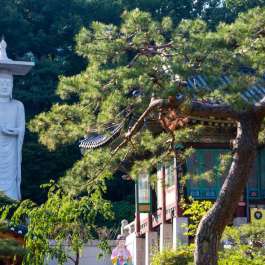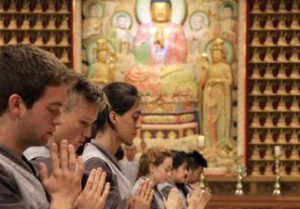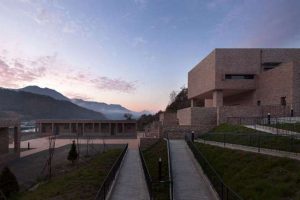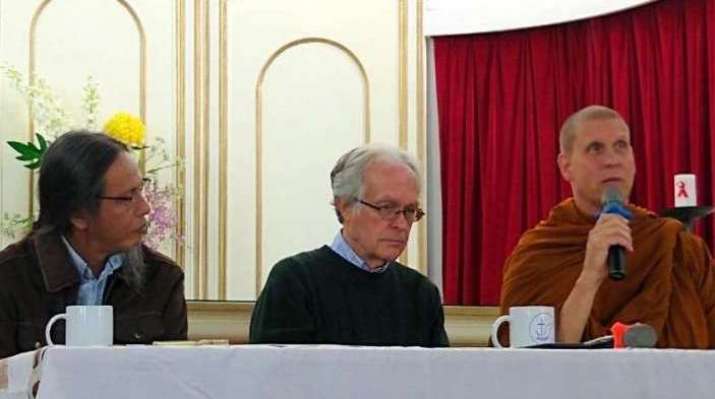
Theravada monk Ajahn Chandako and Christian counselor and consecrated member of the Focolare Movement Joseph Khor spoke to an audience at the Kowloon Union Church in Hong Kong on 17 January about what their respective religions teach about political participation. The conversation brought thousands of years of religious wisdom to bear on an issue close to the hearts of progressive Buddhists and others around the world. The speakers also brought global perspectives: Chandako being from the United States and currently residing at Vimutti Buddhist Monastery near Auckland, New Zealand, and Khor bringing an education spanning from Sophia University in Italy to Hong Kong University, and to his work as a Gestalt therapist in Hong Kong.
As a progressive Buddhist writer and educator, and a dabbler in interfaith dialogue, I was hopeful but unsure of what to expect. At times such events devolve into theoretical minutia, and sometimes they devolve into the very personal predilections of one of the speakers. However, both Chandako and Khor managed to tread a fine middle way, speaking at times of very personal experiences and spiritual journeys, and at times of the broad theoretical and historical paths of Buddhism and Christianity.
Ajahn Chandako offered an engaged Buddhist approach, but one rooted deeply in the Buddhist teaching of loving-kindness and of overcoming one’s own ill will. While he repeatedly emphasized that Buddhism is not a passive path, he did not stray from the generally individualized focus of Buddhist practice, especially as taught in the Theravada tradition. In fact, he noted that the common dichotomy of individual versus social growth is illusory, stating: “It’s never completely either individual freedom or social freedom. They really go together.”
To illustrate, Ajahn Chandako gave the example of a hermit monk, isolated in a cave far from society. Even if that person has little contact with the world, his (or her) life may inspire others, and in fact such individuals did inspire Ajahn Chandako. “So,” he said, their isolated practices “did have an effect.” Turning to the very psychological practice of Buddhism, he suggested that, “Simply by changing the minds of other people, you could bring a profound change in society.” In fact, what brought him to become a monk in the first place was thinking about what he could do as a young man to bring the most benefit to the world—he realized that the most important thing he could do was to clean up his own mind.
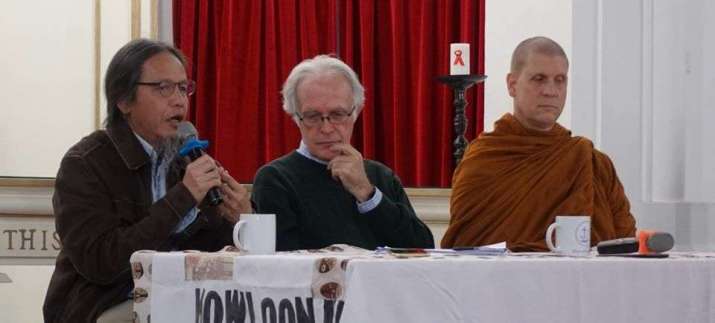
Addressing the importance of cultivating good intentions in the world, Chandako said: “Some people think you have to be angry or you’ll be apathetic. But no, there are other avenues out there. We have to look after our own happiness, our own piece of mind.”
Khor offered a deeply heartfelt account of his time working in Hong Kong during the recent political unrest, noting that here there is too much us versus them, blue versus yellow. “A social movement,” he advised, “must be like Martin Luther King Jr.’s ‘I have a dream’ speech. It cannot be a quest to destroy some ‘other.’” He continued that in fact, separation is the work of a devil, in the Christian perspective. The goal must be a greater brotherhood.
Chandako agreed, saying that from a Buddhist view, “It’s easy to say, ‘be kind and loving to your enemy’ until someone criticizes you or harms someone you care about. Then it’s not so easy. So we have practices in Buddhism aimed at eliminating anger. The first is mindfulness training. If we are not even aware of our mental states, we are just blindly following them. When we do this over and over again, we build a habit and our habit of anger becomes smaller and smaller.”
Khor further recounted an experience of being on the street during a protest when a police officer appeared to fire a bean bag round directly at him. “I was angry, but I thought, ‘I have to be kind to the police.’” Looking beyond this particular action, he said we are all connected and we must realize that: “If we agree that we are all one, if I’m hurting you, I’m hurting myself.”
Chandako elaborated with a simple example of the Buddhist teaching of karma and of causes and conditions, adding that we might think: “What’s it like to be a police officer? Then we can see that even if they are acting cruelly, we can understand why. And then the response is hopefully one from wisdom and understanding. As you go up the political chain, it is easy to depersonalize. These are people too.”
Khor agreed, adding: “We must work for one another. I work with protesters and they are very nice and pure, with good motivations. They have conflict in their families. Their parents only talk about money, money, money, nothing else. I want to ask them, ‘how do you work for justice without money?’ We have to try to recognize that the two camps have something good.”
This drive toward reconciliation and mutual understanding permeated the conversation. Despite the obvious theological differences, both speakers listened deeply to one another and offered complimentary advice and reflections. In this way they modeled their own philosophies: seeking a brotherhood of humanity and overcoming barriers between self and other.

Conversations like this are happening around the world: people both deeply committed to a tradition and yet deeply involved in the society around them. They are hard to find sometimes, lost in the noise of our current fast-paced and hyper-competitive world. These conversations, these religious encounters, give me hope.
As our levels of material comfort increase, often so too do the walls around us, separating us from people who might disagree. And yet, the very practice of our traditions, when we ourselves step out of the noise of daily life, point us toward interconnectedness and deep concern for one another.
It is hard to say what ripples of effect this small gathering might have here in Hong Kong, or beyond. But we might hope they create some harmony in those who attended and outward to those they come in contact with, and outward further and further throughout the world. One of the deep truths I will take away, hopefully helping to guide myself and others positively in the future, was Ajahn Chandako’s statement that: “If you are living a life of integrity, you are already in politics.” It is not a matter of whether or not to be involved, but rather just how we are to do it, today and through our lives.
See more








